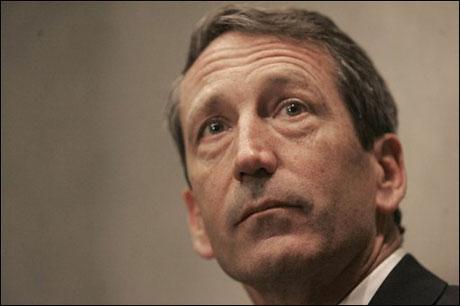Advertisement
S.C. Governor Says He Was In South America

South Carolina Gov. Mark Sanford has told a local newspaper that he was in South America during a days-long unexplained absence, not hiking the Appalachian Trail as his staff told the public when state leaders raised questions about his whereabouts.
The State newspaper reported that Sanford arrived Wednesday morning at Atlanta's Hartsville-Jackson International Airport on a flight from Buenos Aires, Argentina.
Sanford's spokesman Joel Sawyer declined to comment Wednesday morning.
The Republican governor told the newspaper that he decided at the last minute to go to the South American country. He said he had considered hiking on the Appalachian Trail but wanted to do something "exotic."
Sanford said he was alone on the trip and declined to give any additional details about what he did other than to say he drove along the coastline.
Sanford was last seen at work Thursday. On Monday, a state legislator raised questions about where he was after hearing reports from security officials that the governor could not be contacted and his whereabouts were unknown. The governor's wife, Jenny Sanford, told The Associated Press she had not seen him since Thursday but was not concerned because he'd told her he wanted to get away and do some writing.
Late Monday, Sanford's staff said he had been hiking the Appalachian Trail. They said Tuesday that he had called in and planned to cut his trip short and return to work Wednesday because of all the attention his absence was getting.
The governor's spokesman, Joel Sawyer, said Sanford wanted to get away to clear his head after the legislative session, during which he lost a key battle. Jenny Sanford said Tuesday, "Leave us to our privacy."
When The State asked Sanford at the airport why his staff said he was on the Appalachian Trail, Sanford replied, "I don't know."
Sanford later said that "in fairness to his staff," he had told them he might go hiking on the Appalachian Trial.
Critics of the two-term Republican wondered why it took nine hours after reporters started asking questions for the governor's staff to say what the state's chief executive was doing.
Sanford's aides stopped answering questions about his trip, including where he was on the 2,175-mile trail, whether he was with security and if anyone else could confirm his whereabouts.
Republican state Sen. Jake Knotts started asking questions Monday about a rumor that Sanford had disappeared in a state law enforcement vehicle.
Sanford, a trim, 49-year-old former real estate investor and Air Force reservist, is typically drained at the end of a legislative session, former aides said. State Sen. Tom Davis, a Beaufort Republican and Sanford's former chief of staff, said he visited with Sanford last Wednesday and could tell the governor was ready for a break.
"It's not unusual to take off and kind of be by himself," Davis said. "It's part of what makes him him."
The governor has long been known as a loner — bucking GOP leadership during three U.S. House terms and casting the only dissenting vote on Medicaid coverage for some breast and cervical cancer treatment. He clashes often with the Republicans who control both chambers of his state Legislature, once famously carrying two piglets to the door of the House in opposition to what he said was pork-barrel spending.
But past vacations never left Sanford completely out of touch, said Chris Drummond, Sanford's former spokesman. At worst, Sanford would call in daily or would respond to voice mails.
Who was in charge became the political and practical question.
Essentially, Sanford's staffers said they'd decide who to call if an emergency popped up and the governor couldn't be reached. South Carolina's constitution says a temporary absence would give the lieutenant governor full authority in the state. But the temporary absence has never been defined.
Senate President Pro Tem Glenn McConnell, a Charleston Republican, said the state's law needs to be clarified. He said residents want important decisions to be made by elected leaders.
"In an emergency," he said, "it should be those people who consult with staff to make a decision and not the other way around."
This program aired on June 24, 2009. The audio for this program is not available.